Internet Addiction: Risks and Usage Among Canadian College Students
VerifiedAdded on 2023/05/31
|8
|1826
|217
Essay
AI Summary
This essay examines the problematic internet usage (PIU) among Canadian college students and its impact on their psychological well-being, social interactions, and academic performance. It argues that unlimited web access creates behavioral risks and stressful life events, leading to internet addiction. The essay highlights the gap in previous research, which primarily focused on gender differences rather than the stressful life events and addiction caused by extensive internet access. It discusses how the ubiquity of the internet on college campuses has created a varied learning environment, with both opportunities and risks. The essay also explores the psychological and environmental determinants that make college students vulnerable to internet addiction, such as increased free time and reduced parental regulation. It concludes by emphasizing the need for strategies and therapeutic interventions to prevent internet addiction and promote psychological well-being among college students.
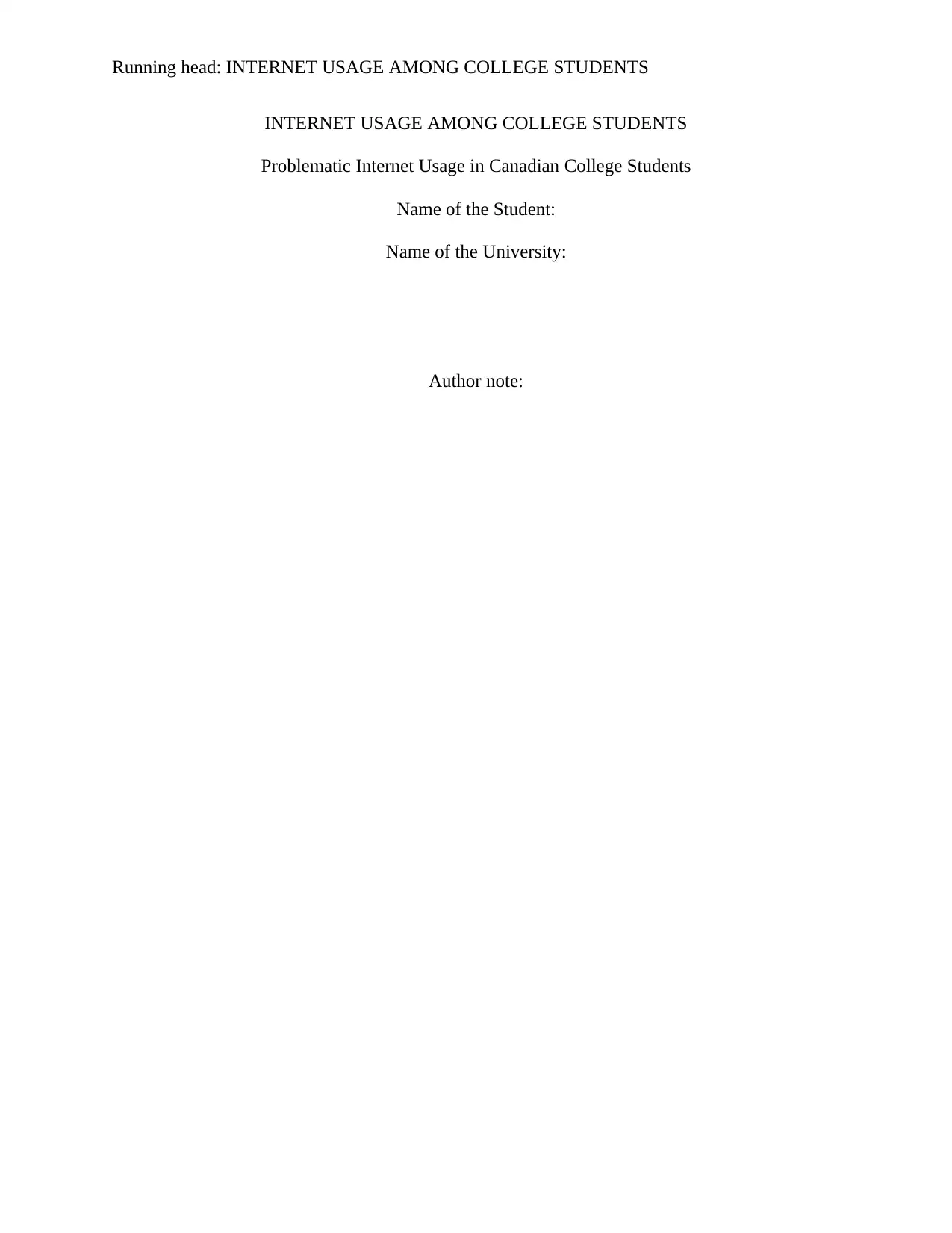
Running head: INTERNET USAGE AMONG COLLEGE STUDENTS
INTERNET USAGE AMONG COLLEGE STUDENTS
Problematic Internet Usage in Canadian College Students
Name of the Student:
Name of the University:
Author note:
INTERNET USAGE AMONG COLLEGE STUDENTS
Problematic Internet Usage in Canadian College Students
Name of the Student:
Name of the University:
Author note:
Paraphrase This Document
Need a fresh take? Get an instant paraphrase of this document with our AI Paraphraser
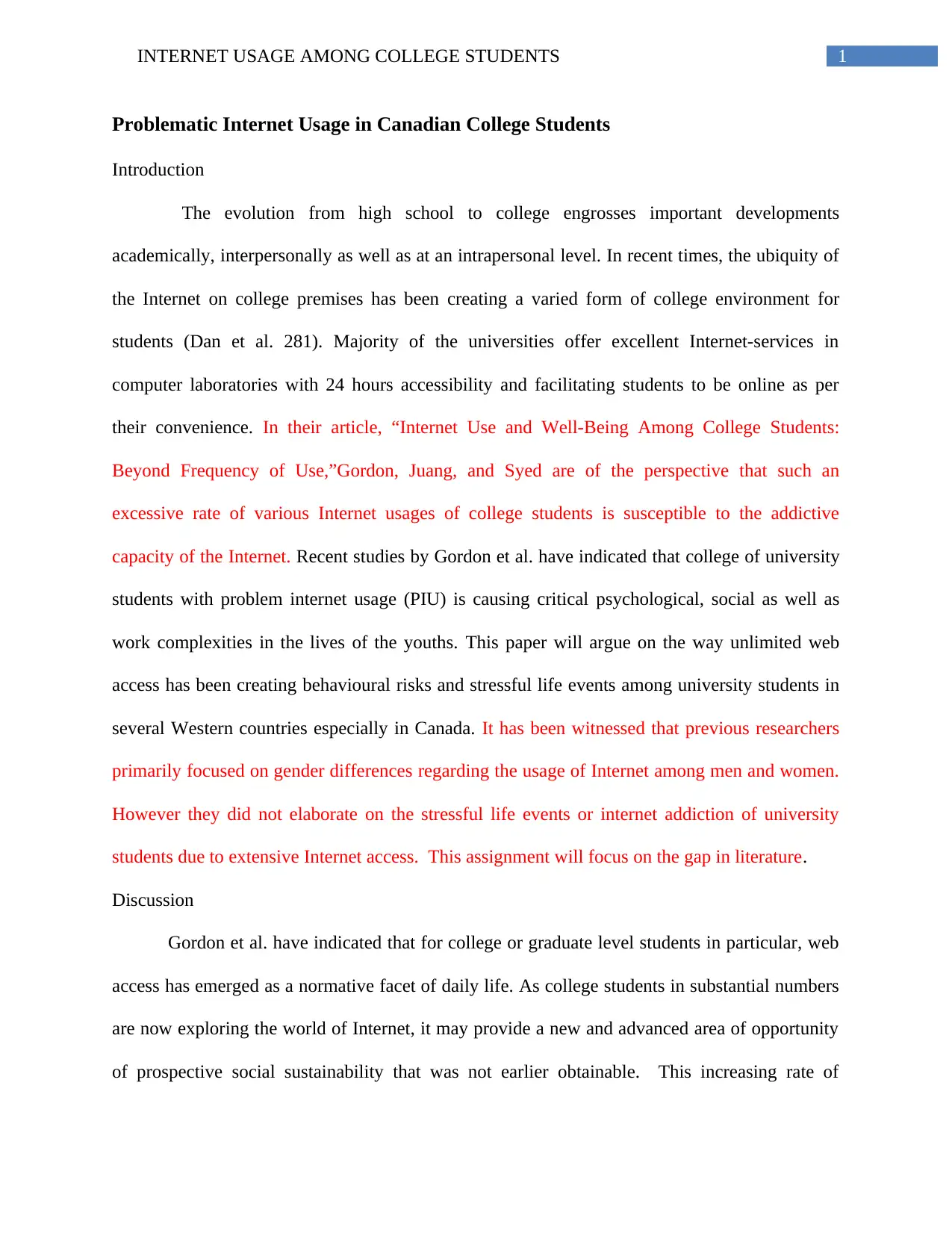
1INTERNET USAGE AMONG COLLEGE STUDENTS
Problematic Internet Usage in Canadian College Students
Introduction
The evolution from high school to college engrosses important developments
academically, interpersonally as well as at an intrapersonal level. In recent times, the ubiquity of
the Internet on college premises has been creating a varied form of college environment for
students (Dan et al. 281). Majority of the universities offer excellent Internet-services in
computer laboratories with 24 hours accessibility and facilitating students to be online as per
their convenience. In their article, “Internet Use and Well-Being Among College Students:
Beyond Frequency of Use,”Gordon, Juang, and Syed are of the perspective that such an
excessive rate of various Internet usages of college students is susceptible to the addictive
capacity of the Internet. Recent studies by Gordon et al. have indicated that college of university
students with problem internet usage (PIU) is causing critical psychological, social as well as
work complexities in the lives of the youths. This paper will argue on the way unlimited web
access has been creating behavioural risks and stressful life events among university students in
several Western countries especially in Canada. It has been witnessed that previous researchers
primarily focused on gender differences regarding the usage of Internet among men and women.
However they did not elaborate on the stressful life events or internet addiction of university
students due to extensive Internet access. This assignment will focus on the gap in literature.
Discussion
Gordon et al. have indicated that for college or graduate level students in particular, web
access has emerged as a normative facet of daily life. As college students in substantial numbers
are now exploring the world of Internet, it may provide a new and advanced area of opportunity
of prospective social sustainability that was not earlier obtainable. This increasing rate of
Problematic Internet Usage in Canadian College Students
Introduction
The evolution from high school to college engrosses important developments
academically, interpersonally as well as at an intrapersonal level. In recent times, the ubiquity of
the Internet on college premises has been creating a varied form of college environment for
students (Dan et al. 281). Majority of the universities offer excellent Internet-services in
computer laboratories with 24 hours accessibility and facilitating students to be online as per
their convenience. In their article, “Internet Use and Well-Being Among College Students:
Beyond Frequency of Use,”Gordon, Juang, and Syed are of the perspective that such an
excessive rate of various Internet usages of college students is susceptible to the addictive
capacity of the Internet. Recent studies by Gordon et al. have indicated that college of university
students with problem internet usage (PIU) is causing critical psychological, social as well as
work complexities in the lives of the youths. This paper will argue on the way unlimited web
access has been creating behavioural risks and stressful life events among university students in
several Western countries especially in Canada. It has been witnessed that previous researchers
primarily focused on gender differences regarding the usage of Internet among men and women.
However they did not elaborate on the stressful life events or internet addiction of university
students due to extensive Internet access. This assignment will focus on the gap in literature.
Discussion
Gordon et al. have indicated that for college or graduate level students in particular, web
access has emerged as a normative facet of daily life. As college students in substantial numbers
are now exploring the world of Internet, it may provide a new and advanced area of opportunity
of prospective social sustainability that was not earlier obtainable. This increasing rate of
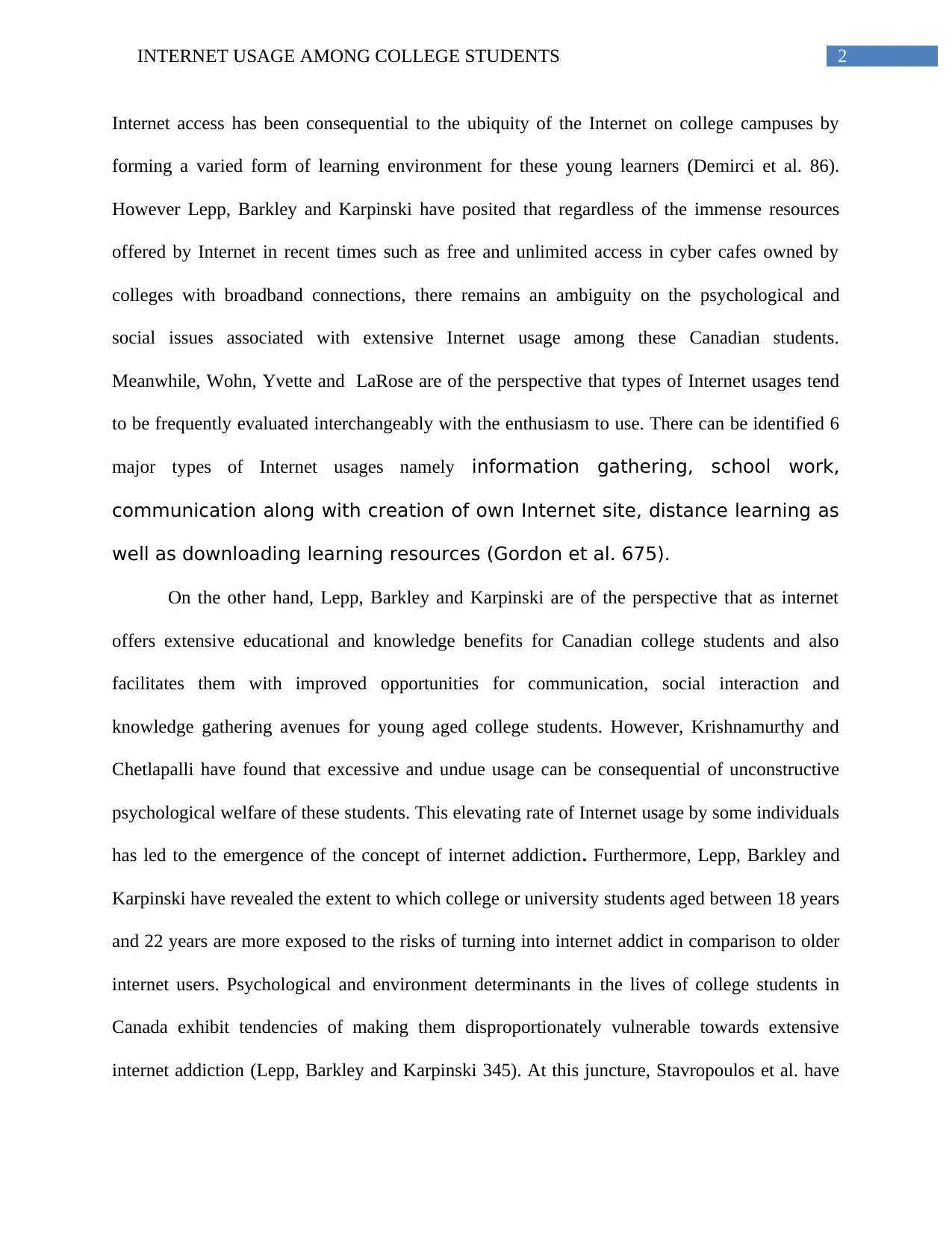
2INTERNET USAGE AMONG COLLEGE STUDENTS
Internet access has been consequential to the ubiquity of the Internet on college campuses by
forming a varied form of learning environment for these young learners (Demirci et al. 86).
However Lepp, Barkley and Karpinski have posited that regardless of the immense resources
offered by Internet in recent times such as free and unlimited access in cyber cafes owned by
colleges with broadband connections, there remains an ambiguity on the psychological and
social issues associated with extensive Internet usage among these Canadian students.
Meanwhile, Wohn, Yvette and LaRose are of the perspective that types of Internet usages tend
to be frequently evaluated interchangeably with the enthusiasm to use. There can be identified 6
major types of Internet usages namely information gathering, school work,
communication along with creation of own Internet site, distance learning as
well as downloading learning resources (Gordon et al. 675).
On the other hand, Lepp, Barkley and Karpinski are of the perspective that as internet
offers extensive educational and knowledge benefits for Canadian college students and also
facilitates them with improved opportunities for communication, social interaction and
knowledge gathering avenues for young aged college students. However, Krishnamurthy and
Chetlapalli have found that excessive and undue usage can be consequential of unconstructive
psychological welfare of these students. This elevating rate of Internet usage by some individuals
has led to the emergence of the concept of internet addiction. Furthermore, Lepp, Barkley and
Karpinski have revealed the extent to which college or university students aged between 18 years
and 22 years are more exposed to the risks of turning into internet addict in comparison to older
internet users. Psychological and environment determinants in the lives of college students in
Canada exhibit tendencies of making them disproportionately vulnerable towards extensive
internet addiction (Lepp, Barkley and Karpinski 345). At this juncture, Stavropoulos et al. have
Internet access has been consequential to the ubiquity of the Internet on college campuses by
forming a varied form of learning environment for these young learners (Demirci et al. 86).
However Lepp, Barkley and Karpinski have posited that regardless of the immense resources
offered by Internet in recent times such as free and unlimited access in cyber cafes owned by
colleges with broadband connections, there remains an ambiguity on the psychological and
social issues associated with extensive Internet usage among these Canadian students.
Meanwhile, Wohn, Yvette and LaRose are of the perspective that types of Internet usages tend
to be frequently evaluated interchangeably with the enthusiasm to use. There can be identified 6
major types of Internet usages namely information gathering, school work,
communication along with creation of own Internet site, distance learning as
well as downloading learning resources (Gordon et al. 675).
On the other hand, Lepp, Barkley and Karpinski are of the perspective that as internet
offers extensive educational and knowledge benefits for Canadian college students and also
facilitates them with improved opportunities for communication, social interaction and
knowledge gathering avenues for young aged college students. However, Krishnamurthy and
Chetlapalli have found that excessive and undue usage can be consequential of unconstructive
psychological welfare of these students. This elevating rate of Internet usage by some individuals
has led to the emergence of the concept of internet addiction. Furthermore, Lepp, Barkley and
Karpinski have revealed the extent to which college or university students aged between 18 years
and 22 years are more exposed to the risks of turning into internet addict in comparison to older
internet users. Psychological and environment determinants in the lives of college students in
Canada exhibit tendencies of making them disproportionately vulnerable towards extensive
internet addiction (Lepp, Barkley and Karpinski 345). At this juncture, Stavropoulos et al. have
⊘ This is a preview!⊘
Do you want full access?
Subscribe today to unlock all pages.

Trusted by 1+ million students worldwide
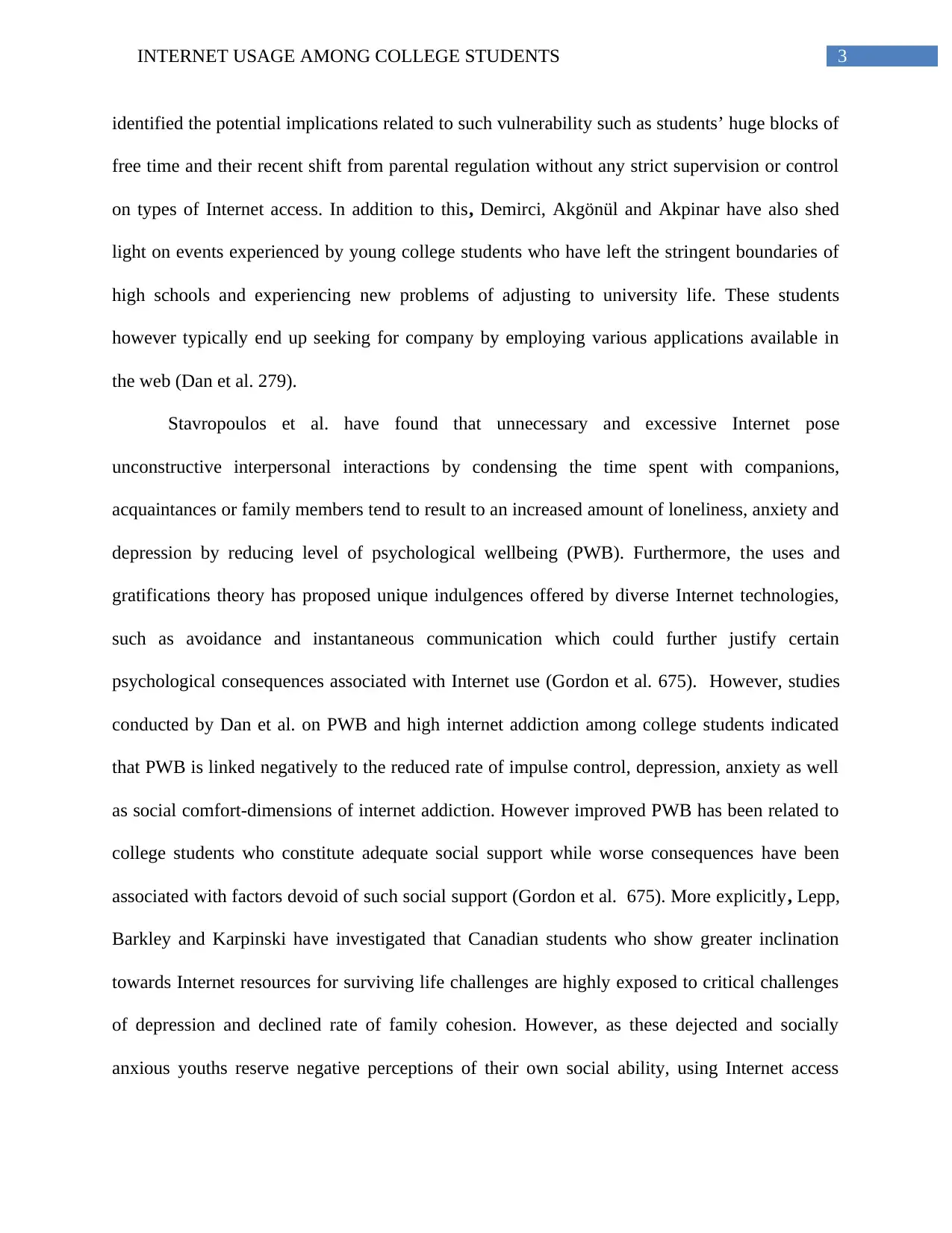
3INTERNET USAGE AMONG COLLEGE STUDENTS
identified the potential implications related to such vulnerability such as students’ huge blocks of
free time and their recent shift from parental regulation without any strict supervision or control
on types of Internet access. In addition to this, Demirci, Akgönül and Akpinar have also shed
light on events experienced by young college students who have left the stringent boundaries of
high schools and experiencing new problems of adjusting to university life. These students
however typically end up seeking for company by employing various applications available in
the web (Dan et al. 279).
Stavropoulos et al. have found that unnecessary and excessive Internet pose
unconstructive interpersonal interactions by condensing the time spent with companions,
acquaintances or family members tend to result to an increased amount of loneliness, anxiety and
depression by reducing level of psychological wellbeing (PWB). Furthermore, the uses and
gratifications theory has proposed unique indulgences offered by diverse Internet technologies,
such as avoidance and instantaneous communication which could further justify certain
psychological consequences associated with Internet use (Gordon et al. 675). However, studies
conducted by Dan et al. on PWB and high internet addiction among college students indicated
that PWB is linked negatively to the reduced rate of impulse control, depression, anxiety as well
as social comfort-dimensions of internet addiction. However improved PWB has been related to
college students who constitute adequate social support while worse consequences have been
associated with factors devoid of such social support (Gordon et al. 675). More explicitly, Lepp,
Barkley and Karpinski have investigated that Canadian students who show greater inclination
towards Internet resources for surviving life challenges are highly exposed to critical challenges
of depression and declined rate of family cohesion. However, as these dejected and socially
anxious youths reserve negative perceptions of their own social ability, using Internet access
identified the potential implications related to such vulnerability such as students’ huge blocks of
free time and their recent shift from parental regulation without any strict supervision or control
on types of Internet access. In addition to this, Demirci, Akgönül and Akpinar have also shed
light on events experienced by young college students who have left the stringent boundaries of
high schools and experiencing new problems of adjusting to university life. These students
however typically end up seeking for company by employing various applications available in
the web (Dan et al. 279).
Stavropoulos et al. have found that unnecessary and excessive Internet pose
unconstructive interpersonal interactions by condensing the time spent with companions,
acquaintances or family members tend to result to an increased amount of loneliness, anxiety and
depression by reducing level of psychological wellbeing (PWB). Furthermore, the uses and
gratifications theory has proposed unique indulgences offered by diverse Internet technologies,
such as avoidance and instantaneous communication which could further justify certain
psychological consequences associated with Internet use (Gordon et al. 675). However, studies
conducted by Dan et al. on PWB and high internet addiction among college students indicated
that PWB is linked negatively to the reduced rate of impulse control, depression, anxiety as well
as social comfort-dimensions of internet addiction. However improved PWB has been related to
college students who constitute adequate social support while worse consequences have been
associated with factors devoid of such social support (Gordon et al. 675). More explicitly, Lepp,
Barkley and Karpinski have investigated that Canadian students who show greater inclination
towards Internet resources for surviving life challenges are highly exposed to critical challenges
of depression and declined rate of family cohesion. However, as these dejected and socially
anxious youths reserve negative perceptions of their own social ability, using Internet access
Paraphrase This Document
Need a fresh take? Get an instant paraphrase of this document with our AI Paraphraser
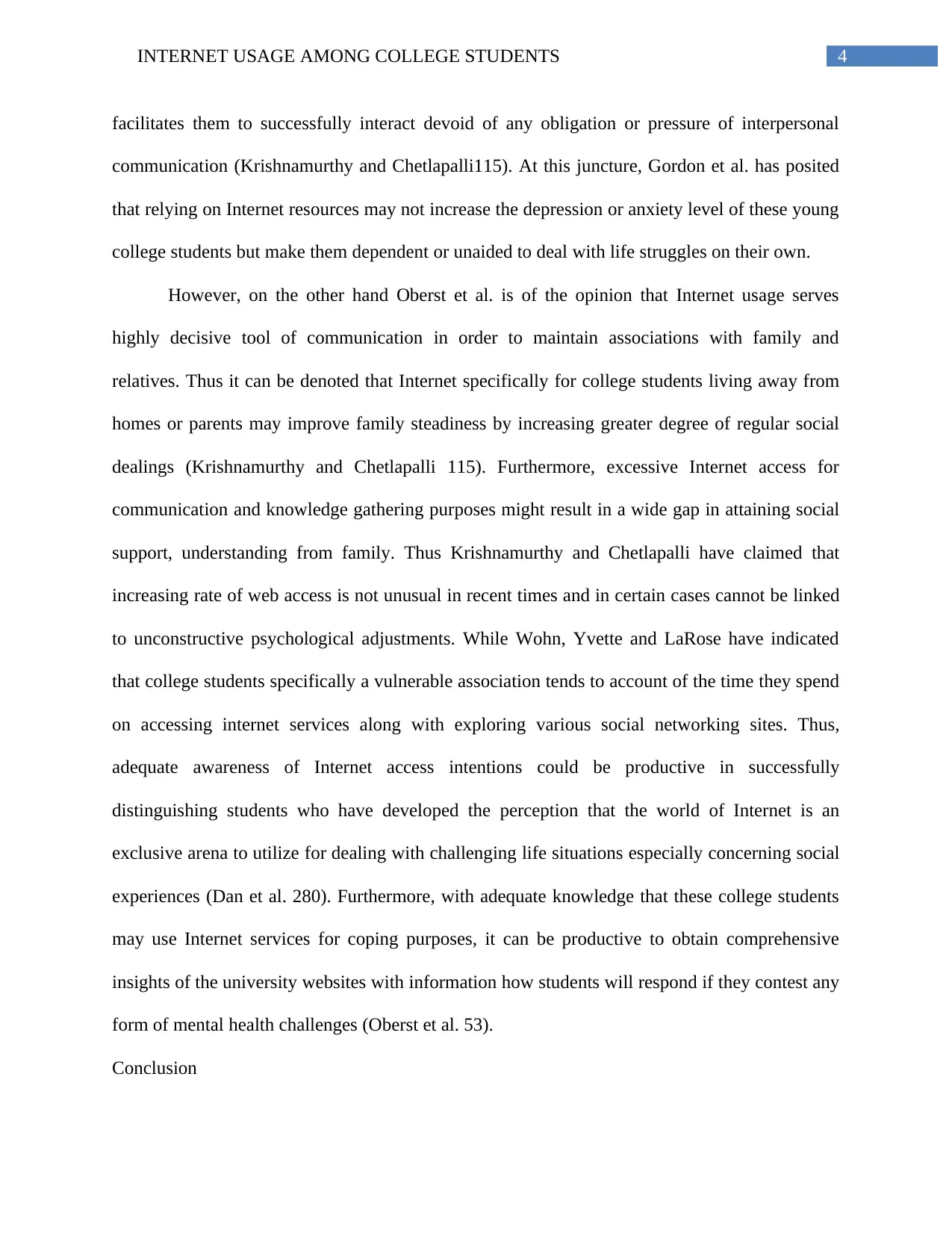
4INTERNET USAGE AMONG COLLEGE STUDENTS
facilitates them to successfully interact devoid of any obligation or pressure of interpersonal
communication (Krishnamurthy and Chetlapalli115). At this juncture, Gordon et al. has posited
that relying on Internet resources may not increase the depression or anxiety level of these young
college students but make them dependent or unaided to deal with life struggles on their own.
However, on the other hand Oberst et al. is of the opinion that Internet usage serves
highly decisive tool of communication in order to maintain associations with family and
relatives. Thus it can be denoted that Internet specifically for college students living away from
homes or parents may improve family steadiness by increasing greater degree of regular social
dealings (Krishnamurthy and Chetlapalli 115). Furthermore, excessive Internet access for
communication and knowledge gathering purposes might result in a wide gap in attaining social
support, understanding from family. Thus Krishnamurthy and Chetlapalli have claimed that
increasing rate of web access is not unusual in recent times and in certain cases cannot be linked
to unconstructive psychological adjustments. While Wohn, Yvette and LaRose have indicated
that college students specifically a vulnerable association tends to account of the time they spend
on accessing internet services along with exploring various social networking sites. Thus,
adequate awareness of Internet access intentions could be productive in successfully
distinguishing students who have developed the perception that the world of Internet is an
exclusive arena to utilize for dealing with challenging life situations especially concerning social
experiences (Dan et al. 280). Furthermore, with adequate knowledge that these college students
may use Internet services for coping purposes, it can be productive to obtain comprehensive
insights of the university websites with information how students will respond if they contest any
form of mental health challenges (Oberst et al. 53).
Conclusion
facilitates them to successfully interact devoid of any obligation or pressure of interpersonal
communication (Krishnamurthy and Chetlapalli115). At this juncture, Gordon et al. has posited
that relying on Internet resources may not increase the depression or anxiety level of these young
college students but make them dependent or unaided to deal with life struggles on their own.
However, on the other hand Oberst et al. is of the opinion that Internet usage serves
highly decisive tool of communication in order to maintain associations with family and
relatives. Thus it can be denoted that Internet specifically for college students living away from
homes or parents may improve family steadiness by increasing greater degree of regular social
dealings (Krishnamurthy and Chetlapalli 115). Furthermore, excessive Internet access for
communication and knowledge gathering purposes might result in a wide gap in attaining social
support, understanding from family. Thus Krishnamurthy and Chetlapalli have claimed that
increasing rate of web access is not unusual in recent times and in certain cases cannot be linked
to unconstructive psychological adjustments. While Wohn, Yvette and LaRose have indicated
that college students specifically a vulnerable association tends to account of the time they spend
on accessing internet services along with exploring various social networking sites. Thus,
adequate awareness of Internet access intentions could be productive in successfully
distinguishing students who have developed the perception that the world of Internet is an
exclusive arena to utilize for dealing with challenging life situations especially concerning social
experiences (Dan et al. 280). Furthermore, with adequate knowledge that these college students
may use Internet services for coping purposes, it can be productive to obtain comprehensive
insights of the university websites with information how students will respond if they contest any
form of mental health challenges (Oberst et al. 53).
Conclusion
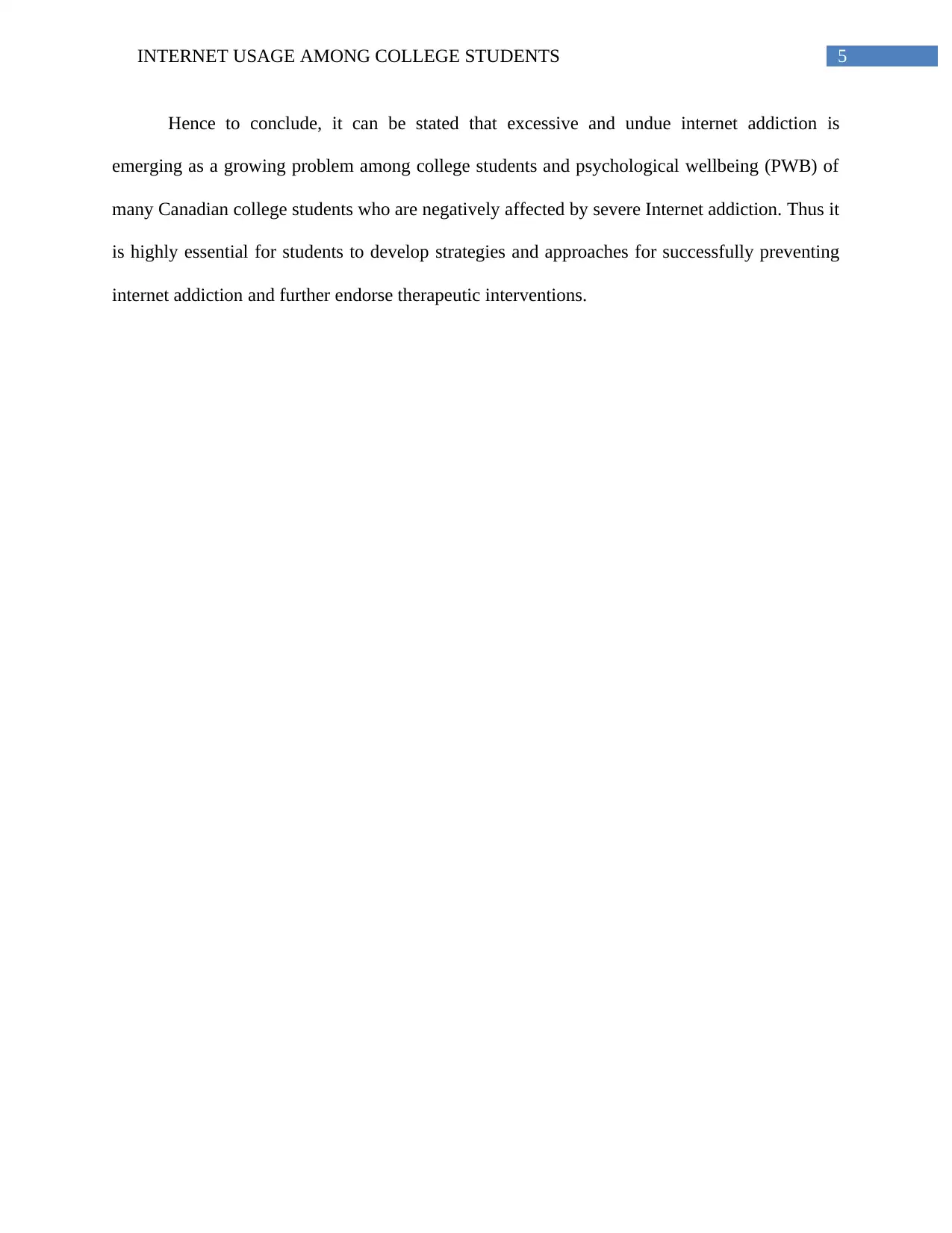
5INTERNET USAGE AMONG COLLEGE STUDENTS
Hence to conclude, it can be stated that excessive and undue internet addiction is
emerging as a growing problem among college students and psychological wellbeing (PWB) of
many Canadian college students who are negatively affected by severe Internet addiction. Thus it
is highly essential for students to develop strategies and approaches for successfully preventing
internet addiction and further endorse therapeutic interventions.
Hence to conclude, it can be stated that excessive and undue internet addiction is
emerging as a growing problem among college students and psychological wellbeing (PWB) of
many Canadian college students who are negatively affected by severe Internet addiction. Thus it
is highly essential for students to develop strategies and approaches for successfully preventing
internet addiction and further endorse therapeutic interventions.
⊘ This is a preview!⊘
Do you want full access?
Subscribe today to unlock all pages.

Trusted by 1+ million students worldwide
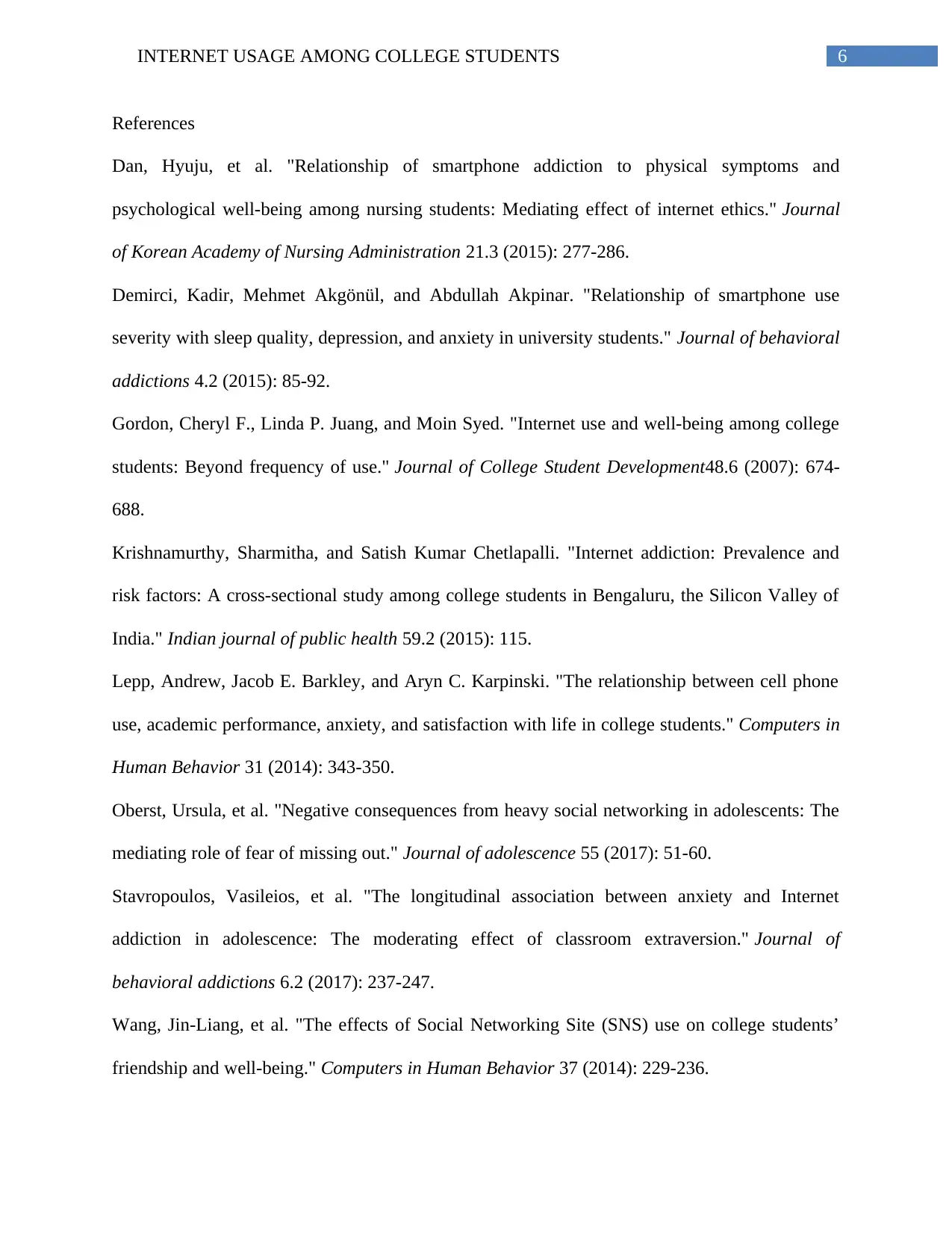
6INTERNET USAGE AMONG COLLEGE STUDENTS
References
Dan, Hyuju, et al. "Relationship of smartphone addiction to physical symptoms and
psychological well-being among nursing students: Mediating effect of internet ethics." Journal
of Korean Academy of Nursing Administration 21.3 (2015): 277-286.
Demirci, Kadir, Mehmet Akgönül, and Abdullah Akpinar. "Relationship of smartphone use
severity with sleep quality, depression, and anxiety in university students." Journal of behavioral
addictions 4.2 (2015): 85-92.
Gordon, Cheryl F., Linda P. Juang, and Moin Syed. "Internet use and well-being among college
students: Beyond frequency of use." Journal of College Student Development48.6 (2007): 674-
688.
Krishnamurthy, Sharmitha, and Satish Kumar Chetlapalli. "Internet addiction: Prevalence and
risk factors: A cross-sectional study among college students in Bengaluru, the Silicon Valley of
India." Indian journal of public health 59.2 (2015): 115.
Lepp, Andrew, Jacob E. Barkley, and Aryn C. Karpinski. "The relationship between cell phone
use, academic performance, anxiety, and satisfaction with life in college students." Computers in
Human Behavior 31 (2014): 343-350.
Oberst, Ursula, et al. "Negative consequences from heavy social networking in adolescents: The
mediating role of fear of missing out." Journal of adolescence 55 (2017): 51-60.
Stavropoulos, Vasileios, et al. "The longitudinal association between anxiety and Internet
addiction in adolescence: The moderating effect of classroom extraversion." Journal of
behavioral addictions 6.2 (2017): 237-247.
Wang, Jin-Liang, et al. "The effects of Social Networking Site (SNS) use on college students’
friendship and well-being." Computers in Human Behavior 37 (2014): 229-236.
References
Dan, Hyuju, et al. "Relationship of smartphone addiction to physical symptoms and
psychological well-being among nursing students: Mediating effect of internet ethics." Journal
of Korean Academy of Nursing Administration 21.3 (2015): 277-286.
Demirci, Kadir, Mehmet Akgönül, and Abdullah Akpinar. "Relationship of smartphone use
severity with sleep quality, depression, and anxiety in university students." Journal of behavioral
addictions 4.2 (2015): 85-92.
Gordon, Cheryl F., Linda P. Juang, and Moin Syed. "Internet use and well-being among college
students: Beyond frequency of use." Journal of College Student Development48.6 (2007): 674-
688.
Krishnamurthy, Sharmitha, and Satish Kumar Chetlapalli. "Internet addiction: Prevalence and
risk factors: A cross-sectional study among college students in Bengaluru, the Silicon Valley of
India." Indian journal of public health 59.2 (2015): 115.
Lepp, Andrew, Jacob E. Barkley, and Aryn C. Karpinski. "The relationship between cell phone
use, academic performance, anxiety, and satisfaction with life in college students." Computers in
Human Behavior 31 (2014): 343-350.
Oberst, Ursula, et al. "Negative consequences from heavy social networking in adolescents: The
mediating role of fear of missing out." Journal of adolescence 55 (2017): 51-60.
Stavropoulos, Vasileios, et al. "The longitudinal association between anxiety and Internet
addiction in adolescence: The moderating effect of classroom extraversion." Journal of
behavioral addictions 6.2 (2017): 237-247.
Wang, Jin-Liang, et al. "The effects of Social Networking Site (SNS) use on college students’
friendship and well-being." Computers in Human Behavior 37 (2014): 229-236.
Paraphrase This Document
Need a fresh take? Get an instant paraphrase of this document with our AI Paraphraser
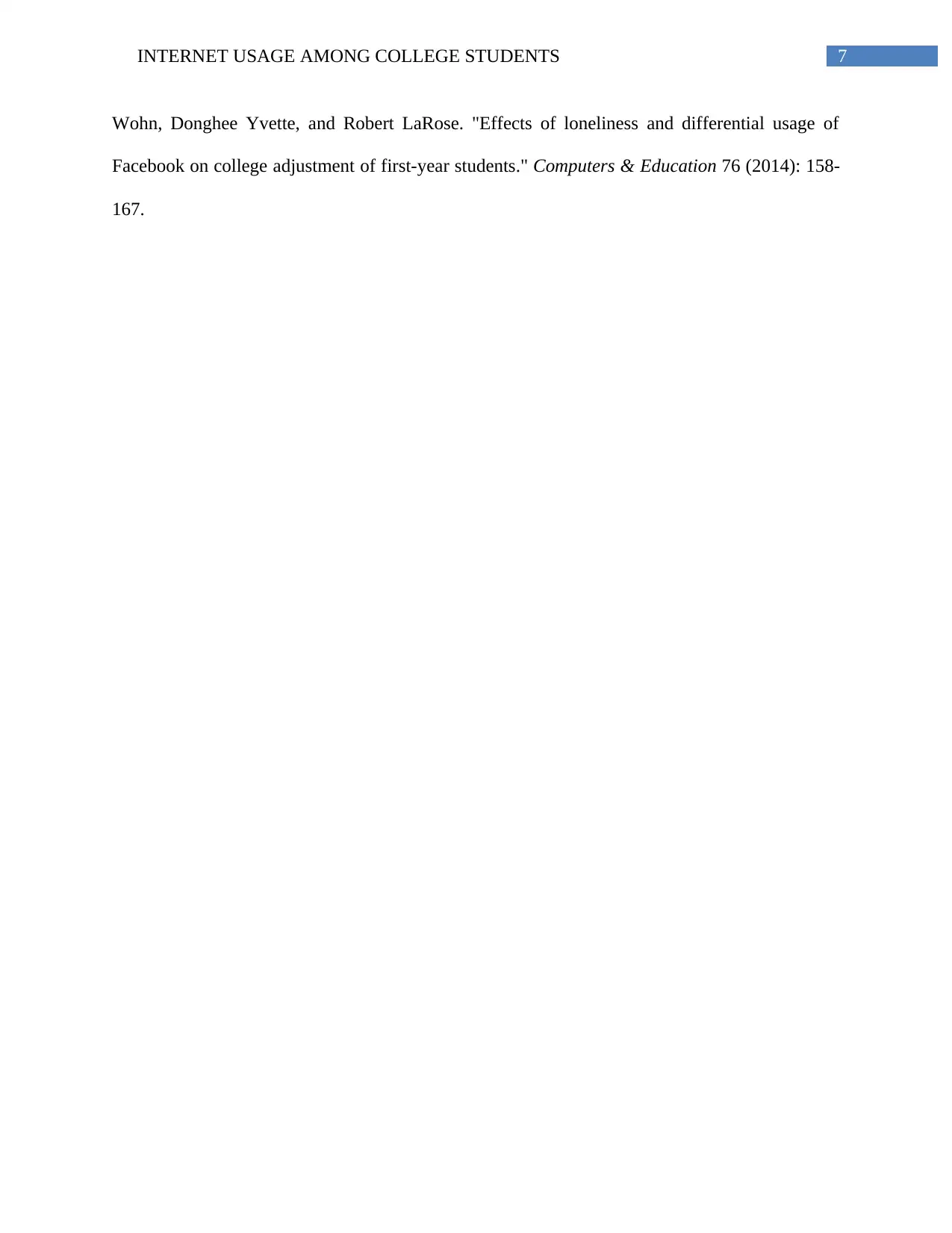
7INTERNET USAGE AMONG COLLEGE STUDENTS
Wohn, Donghee Yvette, and Robert LaRose. "Effects of loneliness and differential usage of
Facebook on college adjustment of first-year students." Computers & Education 76 (2014): 158-
167.
Wohn, Donghee Yvette, and Robert LaRose. "Effects of loneliness and differential usage of
Facebook on college adjustment of first-year students." Computers & Education 76 (2014): 158-
167.
1 out of 8
Related Documents
Your All-in-One AI-Powered Toolkit for Academic Success.
+13062052269
info@desklib.com
Available 24*7 on WhatsApp / Email
![[object Object]](/_next/static/media/star-bottom.7253800d.svg)
Unlock your academic potential
Copyright © 2020–2026 A2Z Services. All Rights Reserved. Developed and managed by ZUCOL.



